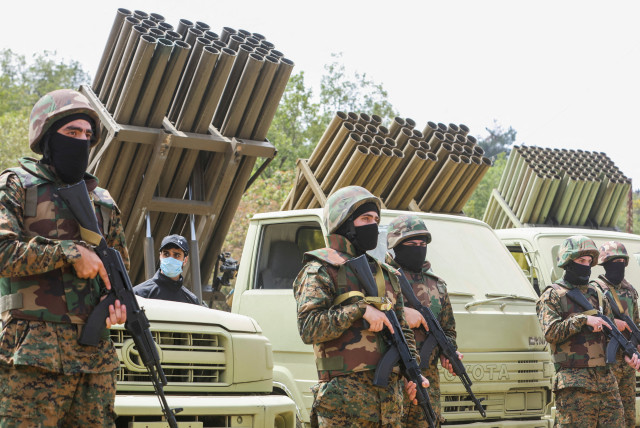Hezbollah built terror museum as Lebanon crumbles - analysis

Lebanon lurches from either murderous chaos in camps like Ain al-Hilweh or occupation by an Iranian-backed terror group.
Fighting this week killed five people and injured dozens at Ain al-Hilweh in Lebanon. This is a small city that is often referred to as a “refugee camp.” Its residents are Palestinians who have been denied rights by Lebanon for seven decades. Increasingly, armed groups in the city have been fighting each other using illegally obtained weapons. The Lebanese army, which is often funded and backed by the West, does not intervene to bring peace and security for civilians.
Meanwhile the terrorist group Hezbollah has been showcasing a new museum. According to the Christian Science Monitor, “confidence is on display at a Hezbollah museum that opened last week in the hills above Baalbek, an ancient Phoenician and Roman city in the Bekaa Valley. The museum is built on a site where Israeli commandos landed by helicopter for a brief mission in 2006 and took selfies.”
The two areas are around a two hour drive from one another. One represents how Lebanon has been drained of security and resources and abandoned by its own government, while the other represents how Iran controls Lebanon via Hezbollah and how Hezbollah has become basically the official government of the country.
Hezbollah showing off as a pseudo-government
Government authorities establish museums of the kind Hezbollah has. The Hezbollah museum has armored vehicles and missiles on display and flies flags of Hezbollah and Lebanon. There is basically an arsenal at the Hezbollah museum, showcasing how it has all the authority of a government, including the keeping of tanks and air defense missiles. Governments maintain tanks and fight wars, and that is what Hezbollah is showcasing and bragging about.
This kind of transition to a government institutional role has been a slow process for decades. It has involved creating its own communications networks and health care and financial services. It also involves using its status in parliament to engage in border disputes with Israel. It also brags about helping to dictate a maritime border deal between Israel and Lebanon. At each stage it increases its power over the country.
Meanwhile for Palestinians in the Hilweh camp there is no museum or institutions of the kind Hezbollah has. Instead, reports make it seem like the camp is a totally chaotic place without laws or security or services from the government. There are heavy weapons being used, including RPGs, right over the heads of civilians. The Lebanese army is also outgunned. A report says that five Lebanese army soldiers were injured when shells hit an area near the camp. The army remains outside, letting the fighting grow. There are thought to be 70,000 people affected by the fighting in the Hilweh area.
Al-Ain media reports that the escalation in the camp “comes in light of the closure of official departments and departments, the water authority, schools, and universities in the city, which is witnessing complete paralysis due to the security developments inside the Ain al-Hilweh camp.” However, a two hour drive away in the hills where Hezbollah maintains its museum and infrastructure, a type of quiet prevails. It is quiet that Hezbollah maintains with tanks and weapons and bunkers. It illustrates how the Lebanese army does little in Lebanon and instead the country lurches from either murderous chaos in camps like Hilweh, or occupation by an Iranian-backed terror group.
Jerusalem Post Store
`; document.getElementById("linkPremium").innerHTML = cont; var divWithLink = document.getElementById("premium-link"); if (divWithLink !== null && divWithLink !== 'undefined') { divWithLink.style.border = "solid 1px #cb0f3e"; divWithLink.style.textAlign = "center"; divWithLink.style.marginBottom = "15px"; divWithLink.style.marginTop = "15px"; divWithLink.style.width = "100%"; divWithLink.style.backgroundColor = "#122952"; divWithLink.style.color = "#ffffff"; divWithLink.style.lineHeight = "1.5"; } } (function (v, i) { });

